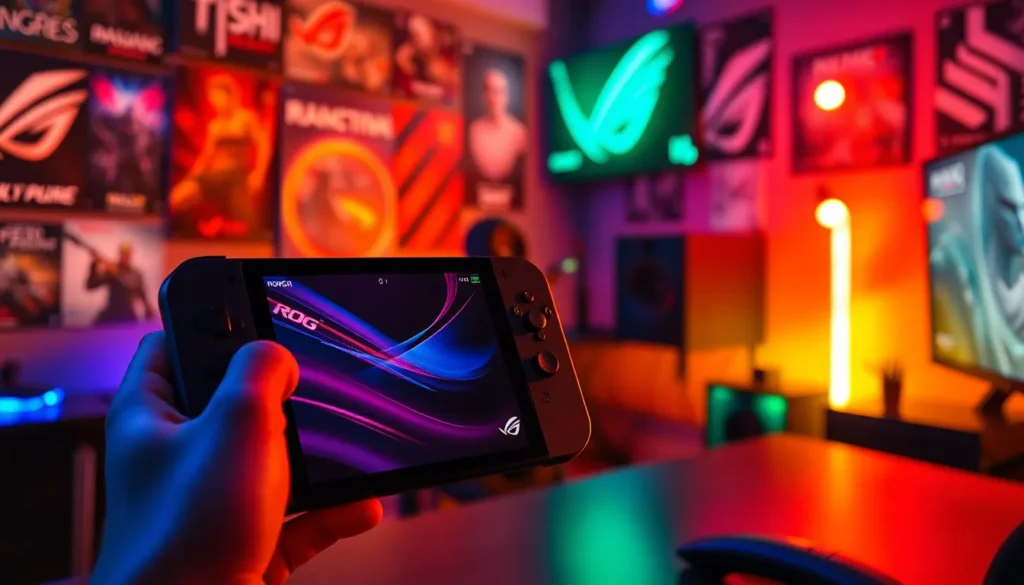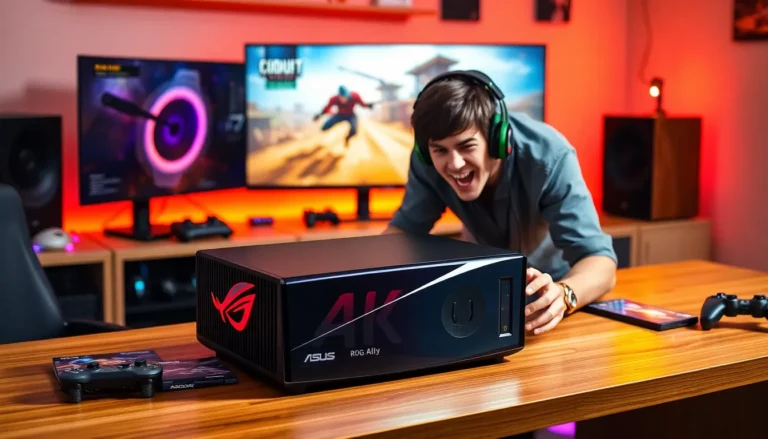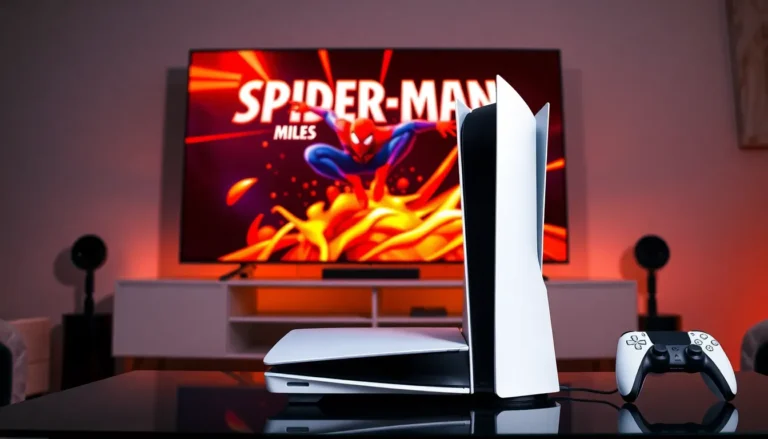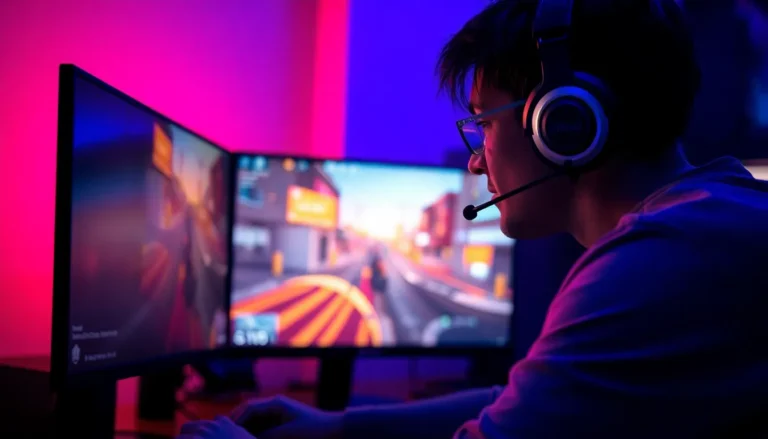In the ever-evolving world of gaming, even the most powerful machines can sometimes act like they’re auditioning for a blooper reel. The ROG Ally, ASUS’s latest handheld marvel, is no exception. While it promises an immersive gaming experience, a few pesky bugs have been known to crash the party, leaving gamers scratching their heads and wondering if they accidentally signed up for a game of glitch roulette.
Table of Contents
ToggleOverview of ROG Ally
The ROG Ally is a handheld gaming device developed by ASUS. Targeted towards gamers seeking portability, the device features a powerful AMD Ryzen Z1 processor, enhancing performance in various gaming environments. With its 7-inch full HD display, it promises vivid graphics and a dynamic viewing experience.
Built-in game compatibility allows users to access popular titles across multiple platforms. This flexibility caters to diverse gaming preferences, whether users enjoy indie games or major AAA releases. Moreover, it supports Windows 11, ensuring a seamless connection with existing libraries and online services.
Integrated with a customizable interface, the ROG Ally enables users to create tailored gaming profiles. Gamers can adjust settings like controls and performance metrics to fit personal gameplay styles. The ergonomic design promotes comfort during extended sessions, making it suitable for on-the-go gaming.
Despite offering advanced features, users have reported several bugs that affect performance. Issues include screen flickering, connectivity problems, and inconsistent game launches. ASUS acknowledges these concerns, actively working on patches to improve user experience. Recent updates have addressed some of these bugs, enhancing stability and performance.
Gamers should monitor ongoing updates to ensure their device operates efficiently. Feedback from the community contributes to resolving common problems, fostering a collaborative environment for improvements. Staying informed about firmware updates helps maximize the capabilities of the ROG Ally, ensuring a satisfying gaming experience.
Common Bugs Identified

Several common bugs have surfaced with the ROG Ally. These issues can disrupt gameplay and detract from the overall user experience.
Performance Issues
Performance issues plague the ROG Ally, particularly during demanding gameplay. Users frequently report screen flickering, which can detract from immersion. Frame rate drops occur in graphically intensive titles, affecting responsiveness. Many gamers have noted inconsistent loading times, making it difficult to transition between sections in games. Affected players often seek solutions through updates or patches that aim to enhance performance metrics.
Connectivity Problems
Connectivity problems hinder the ROG Ally’s functionality in multiplayer settings. Many users experience Wi-Fi drops, impacting online gameplay and requiring frequent reconnections. Bluetooth connectivity may also fail, disrupting connections to external devices like headphones or controllers. In-game voice chat issues contribute to communication problems during team play. ASUS actively investigates these concerns to provide stability in future software updates.
Software Glitches
Software glitches present additional challenges for ROG Ally users. Some games fail to launch, returning users to the home screen unexpectedly. System crashes can occur, interrupting gameplay in critical situations. Additionally, updates may occasionally introduce new bugs rather than resolve existing ones. Regular updates are crucial for fixing these software-related issues and improving reliability, allowing players to enjoy their gaming experience without frustration.
Recent Bug Fixes Released
ASUS has made strides in addressing bugs affecting the ROG Ally’s performance and gameplay experience. Updates aim to resolve critical issues, enhancing overall user satisfaction.
Patch Notes and Updates
Recent patches include fixes for screen flickering, which previously distracted players during sessions. Updates also tackle connectivity issues, improving Wi-Fi stability and Bluetooth reliability. Performance enhancements target frame rate drops, ensuring smoother gameplay in demanding titles. Additionally, recent updates optimize loading times, resulting in quicker game launches. ASUS continues to release updates regularly, emphasizing commitment to user feedback and gameplay quality.
User Feedback
User feedback highlights several persistent issues despite previous fixes. Many players reported ongoing screen flickering, particularly during fast-paced scenarios. Connectivity problems remain a concern, with players experiencing unexpected drops during online matches. System crashes and game-launch failures still occur for a subset of users, impacting enjoyment. ASUS encourages ongoing dialogue with gamers, inviting reports to pinpoint and resolve these issues efficiently. Collaboration between users and developers plays a crucial role in enhancing ROG Ally’s performance.
Future Bug Fixes and Improvements
ASUS plans to release further updates focusing on specific bugs that have been reported by ROG Ally users. These upcoming improvements aim to resolve lingering connectivity issues and optimize overall performance. Users can anticipate solutions targeting screen flickering during intense gameplay scenarios, ensuring a smoother gaming experience.
The company emphasizes the importance of addressing system crashes that continue to disrupt gameplay. Fixes for game launch failures remain a high priority, allowing seamless access to titles without interruptions. Enhanced stability in Wi-Fi connectivity and Bluetooth functionality is also on the agenda, which directly influences multiplayer experiences.
Ongoing communication between ASUS and gamers plays a crucial role in identifying persistent issues. User feedback actively shapes the direction of updates, ensuring that patches effectively target the most pressing concerns. Gamers can expect improvements in frame rates and loading times, aiming to deliver quick game launches even during heavy usage.
ASUS will also examine feedback regarding UI customization. Enhancements to the user interface could provide a more tailored gaming experience. This focus on adaptability demonstrates the company’s commitment to meeting diverse gameplay styles.
The roadmap for future bug fixes includes a variety of updates targeting multiple aspects of the ROG Ally. Users remain encouraged to report any issues they encounter, fostering a collaborative environment that prioritizes user satisfaction.
The ROG Ally stands out as a promising handheld gaming device despite its current bugs. ASUS’s commitment to addressing these issues reflects a dedication to improving user experience. Ongoing updates aim to tackle persistent problems like screen flickering and connectivity issues, ensuring gamers can enjoy a seamless experience.
Feedback from users plays a vital role in shaping future enhancements. As ASUS continues to release patches and updates, the gaming community can look forward to a more stable and enjoyable performance. The collaboration between developers and gamers will ultimately pave the way for the ROG Ally to reach its full potential.




